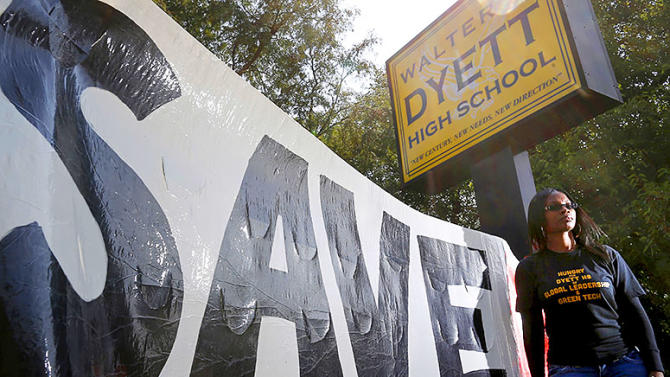Standardized tests? Principal Jamaal Bowman says 'Know your rights'.
President Obama recently spoke out against excessive standardized
testing. The POTUS claimed that this issue, "takes the joy out of
teaching and learning, both for them (teachers) and for the students".
Long before Obama's declaration, Jamaal Bowman, Founding Principal of
CASA (Cornerstone Academy for Social Action) in Bronx, NY, has been
advocate for student and parent rights and the movement to opt out of
standardized tests to promote more holistic approaches to assessment of
student learning. Bowman speaks with YBE about the impact of
standardized tests on Black and Brown students and offers his advice to
their parents.
Governor Andrew Cuomo, who supported Common Core as "state of the art" from the start, has called its implementation in New York State "flawed." He blamed blunders in the rollout for causing "frustration, anxiety, and confusion for children and parents." But Cuomo has never questioned the validity of Common Core, which suggests the mandated review will largely be for show.
Commissioner Elia claims the review procedure will allow "everyone to have a voice, particularly the practitioners who are implementing standards in our schools." However, the first public meeting of the Common Core Task Force held in New Rochelle on October 29 did not include time for public comments. My friend Henry Dircks, a high school social studies teacher on Long Island and the parent of two public school children, does not agree with Elia that the review will allow for all "voices" to be heard. He calls Commissioner Elia's online Common Core Survey incomprehensible and a pretense of public involvement.
Elia has already leaked that more than 70% of responses to the online survey are "positive," although it is not clear what she is counting as a positive response. She claims that this shows surprising strong support for Common Core, however only 1.5% of New York State teachers have responded so far. Submissions continue until November 30.
On the survey, respondents vote on each individual Common Core Standard. The choices are:But the problem with this bogus survey is not each individual standard. No one is going to vote that we should not teach children to read, write, and think. However, nowhere can you vote that Common Core Standards aligned with high-stakes testing have undermined education in New York State, stressed out students and teachers, turned curriculum development over to test design companies, and transformed schools into test prep academies. These are the real reasons parents and teachers oppose the Common Core.
I agree with the Standard as written.
The Standard should be discarded.
The Standard should be in a different grade level. Grade selection is required
The Standard should be broken up into several, more specific Standards. Suggested rewrite is required
The Standard should be rewritten. Suggested rewrite is required
Comments about your feedback. Optional
As Henry tried to complete the survey, it confirmed his belief that NYSED "cannot see the forest for the trees." He eventually gave up and wrote a letter to Commissioner Elia with his Common Core complaints. Henry sent it to me and we agreed it is worth sharing with a broader audience.
Dear Commissioner Elia,
Now that the first quarter's grades are in, and I've guided my high school students through submitting final work and making up for absences, I finally had a chance to breathe and catch up on my own work. So today, I attempted to take the AIM High NY survey on the Common Core Standards. I use the word attempted purposefully; the survey limits the opportunity for personal and professional feedback by leading participants into a mire of boxes to check and comment about for individual standards.
Although I have devoted nearly four years to fighting the Common Core, I will not waste my time navigating this incomprehensible survey, just so that NYSED can say that it's listening to the public.
My concerns about and activism against the Common Core are not centered on the over-testing that students of NY are being subjected to, on the over-reach of the USDOE in forcing the standards upon New York with the promise of Race-To-The-Top funding, or on the massive amount of money being gained by corporate entities such as Pearson Publishing (though I share all of these concerns). Instead, I just think the standards lack any sort of recognition of the students that my colleagues and I teach.
On the elementary level, I believe that the ELA and Math Standards inappropriately introduce topics that are developmentally beyond the capabilities of students. I believe that the math standards confuse students with an over-reliance on word problems, and by focusing their attention on explaining how they arrived at an answer. In these early grades, students need to build confidence in mathematics by getting the "right" answer, not being forced to explain in tedious detail their "work". In ELA, the Common Core's insistence on non-fiction works against children's curiosity and appreciation for reading.
The focus on lexile scores in my daughter's 7th grade ELA class underscores my point.
My daughter has always been an avid reader and has a high lexile score. In line with the standards that call for an ever-growing lexile score, she was restricted from reading books that she was interested in for class reports because the books were below her score. The only books her teachers would allow were obviously meant for adult readers in content and difficulty. Just today, my fifth-grade son told me a story about learning rhyme scheme in his ELA class. He said that the state's method of teaching rhyme scheme was overly complicated, and that his teacher accomplished the same goal in a matter of minutes.
I have been a high school social studies teacher for 23 years. Although the standards have yet to have such a negative impact on my teaching, I have had negative experiences with my own classes in adopting teaching methods advocated by the standards. For instance, there is nothing duller and curiosity-reducing to my eleventh-graders than a "close-read" of whatever 200 year old document I introduce in class. It seems obvious to me that the advocates who want to build literacy and research techniques among my students never considered whether my students would want to learn in this manner. Also, as a social studies veteran, I find the new focus on literacy devalues the purpose of history and civics education. Under the standards, I will be charged with preparing my students to read text rather that learn and apply concepts as a citizen of the U.S.
I find it hard to write all of my objections to the Common Core Standards because there are so many. Added to this is that fact that your predecessor and our governor have ignored these concerns for so long that my list of concerns just keeps growing and growing. My only recommendation is to scrap the Common Core in its entirety, and either return to the completely satisfactory standards that NY State had before this debacle or ask teachers of the "loyal opposition" to sit down and create new NYS standards. Until NYSED gives up this hopeless charade of the standards having value to NY students and teachers, I will keep fighting.
Sincerely,
Henry J. Dircks
Bethpage, New York













